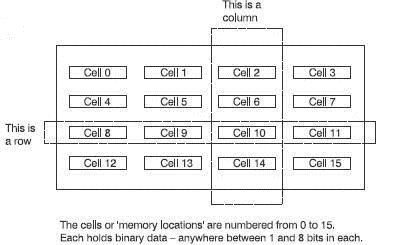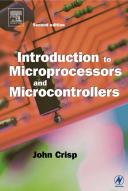Книга: Introduction to Microprocessors and Microcontrollers
RAM
RAM
The letters RAM stands for Random Access Memory which is a silly, out-of-date, name. It should be called read/write memory or RWM but it is so difficult to get something to change once it is established. Anyway, let’s leave the name for the moment and look at the memory.
The memory comes in an integrated circuit looking like a small microprocessor and is usually called a memory chip. Inside, there are a large number of registers, hundreds, thousands, millions depending on the size of the memory. Incidentally, when we are referring to memories, we use the word ‘cell’ instead of register even though they are the same thing.
So, each of the internal cells may have 4, 8, 16, 32, or 64 bits stored in flip-flops. Figure 6.14 shows the register layout in a very small memory containing only 16 cells or locations, each of which can hold 4 bits and is given a memory number or address.

Figure 6.14 The layout of cells in a memory
This RAM word
In prehistoric computing days, the memory would be loaded in order. The first group of bits would go into location 0, the next would go into location 2, then location 3 and so on rather like a shift register. This meant that the time to load or recover the information would increase as we started to fill the memory and have to move further down the memory. This was called sequential access memory (or serial access memory), abbreviated to SAM. This was OK when a large computer may hold 256 bits of information but would be impossibly slow if we tried this trick with a gigabyte.
To overcome this problem, we developed a way to access any memory location in the same amount of time regardless of where in the memory it happens to be stored. This system was called random access memory or RAM.
All memory, whether volatile or non-volatile is now designed as random access memory so it would be much better to divide the two types of memory into read/write and read only memory. But it won’t happen, RAM is too firmly entrenched.
- A flip-flop or bistable
- A register
- Shift registers
- Rotate registers
- Memories
- RAM
- Accessing memory
- Two types of RAM
- Memory organization
- Three types of ROM
- Pin layout of an EPROM
- Pin layout of a SRAM
- Pin layout of a DRAM
- Some more memories that don’t fit into the general pattern
- Memory maps
- Quiz time 6
- Parameter problem
- 2. How to Apply These Terms to Your New Programs
- The Programmers
- Instagram как платформа для реализации.
- Специфика .NET Compact Framework: ADO.NET
- Для чего нужны папки Windows, Documents and Settings, Program Files и Temp?
- Можно ли указать использование по умолчанию вместо C:Program Files другого каталога для установки программ?
- Можно ли удалять из папки Program Files папки деинсталлированных программ?
- Элемент xsl:param
- Классы синхронизации, внедренные в версии .NET Framework 4.0
- 6.1 Program Description Language (PDL)
- The Simplest Windows Program




